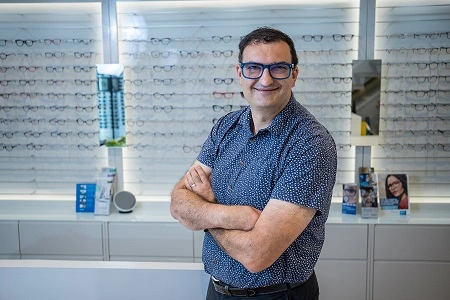Understanding the Hidden Impact of Obesity on Eye Health
When discussions arise around health complications associated with obesity, common references include diabetes, cardiovascular conditions, and joint pain. However, a crucial aspect that often gets overshadowed is eye health. Your eyes, much like vital organs such as the heart or kidneys, depend on a robust vascular system and are intricately linked to the overall functionality of your body. Maintaining optimal eye health is essential for sustaining quality of life, and it's important to recognise that the state of your eyes can reflect broader health concerns.
At Eyes By Design, we observe the manifestations of systemic changes in our patients' eyes regularly. Vision issues frequently do not exist in isolation; instead, they can signify underlying health conditions that require immediate attention and proactive management. Understanding the connection between your systemic health and your visual acuity can empower you to take necessary steps towards better health.

Exploring the Intricate Connection Between Your Body and Eye Health
The eyes may be small, but they are exceptionally vascular, necessitating a constant supply of oxygen and nutrients to function optimally. In individuals carrying excess weight, particularly those classified as obese, metabolic and inflammatory processes can adversely affect these sensitive tissues. This disruption can lead to various eye health issues that may not become apparent until significant damage has occurred.
Significantly, the consequences of these changes do not always manifest immediately. Often, they develop gradually and may go unnoticed until vision is compromised. This underscores the importance of regular eye examinations and a keen awareness of how overall health can directly influence your vision.
Identifying Eye Conditions Potentially Linked to Obesity
Diabetic Retinopathy
Excess weight is a significant risk factor for the development of type 2 diabetes. Over time, elevated blood sugar levels can inflict damage to the tiny blood vessels in the retina, resulting in a condition known as diabetic retinopathy. This condition is among the leading causes of vision loss in working-age adults and can begin without any noticeable symptoms. Therefore, undergoing routine eye exams is crucial for individuals managing diabetes or those at risk of developing this condition.
Glaucoma
Glaucoma is characterised by increased pressure within the eye, which can damage the optic nerve. Although it can occur in anyone, research indicates a potential correlation between obesity and elevated intraocular pressure. This relationship may arise from changes in fluid dynamics within the eye or alterations in blood circulation. Often asymptomatic in its early stages, glaucoma can lead to irreversible vision loss if not detected promptly.
Age-Related Macular Degeneration
The macula, a critical part of the retina responsible for sharp central vision, may be affected by obesity. Some studies suggest that being overweight can accelerate the progression of macular degeneration due to increased inflammation and oxidative stress. This degeneration can hinder daily activities such as reading, recognising faces, and driving, all of which are essential for maintaining independence.
Cataracts
While ageing is the predominant cause of cataracts, individuals with obesity are often at an increased risk of developing them prematurely. Factors such as inflammation and insulin resistance may contribute to changes in the eye's lens. Although cataracts can be effectively treated through surgery, early detection is vital for ensuring the best possible outcomes and preserving vision.
Understanding the Association Between Sleep Apnoea and Eye Health
Obesity is a well-known risk factor for sleep apnoea, a condition that can significantly reduce oxygen flow during sleep and negatively impact sleep quality. Various eye conditions are associated with untreated sleep apnoea, including:
- Floppy Eyelid Syndrome
- Glaucoma
- Non-arteritic Anterior Ischaemic Optic Neuropathy
Furthermore, sleep apnoea can exacerbate dry eye symptoms, particularly in individuals using CPAP machines. If the mask leaks or directs airflow towards the eyes, moisture levels on the eye surface can decrease overnight, resulting in discomfort upon waking.

Tackling Dry Eyes and General Eye Discomfort
Many individuals struggling with obesity report experiencing elevated rates of dry eye symptoms and eye strain. These issues may be linked to hormonal fluctuations, systemic inflammation, or even the medications prescribed to manage associated health conditions. While such symptoms may not always be severe, they can significantly impact one's quality of life and warrant thorough assessment and management.
Essential Strategies for Supporting Your Vision
Prioritise Regular Eye Examinations
For individuals managing high blood pressure, diabetes, or other chronic conditions, regular eye exams are not just recommended; they are essential. At Eyes By Design, we go beyond merely providing a prescription; we conduct comprehensive examinations of the retina, optic nerve, and overall vascular health of the eyes.
Enhance Your Diet for Optimal Eye Health
Adopting a balanced diet rich in leafy greens, vibrant vegetables, healthy fats, and whole grains can significantly bolster both metabolic and ocular health. Nutrients such as lutein, zeaxanthin, omega-3 fatty acids, vitamin E, and zinc are renowned for their protective properties against age-related vision changes and overall eye health.
Incorporate Regular Physical Activity
Engaging in physical activity enhances blood flow, reduces systemic inflammation, and assists in regulating blood sugar levels. Even modest daily movements can yield positive effects on your vision, contributing to better overall health and wellbeing.
Manage Systemic Risk Factors Effectively
Maintaining healthy levels of blood sugar, blood pressure, and cholesterol can slow the progression of obesity-related eye disease and significantly reduce the risk of vision loss. Proactively addressing these factors is crucial for preserving both your eye health and overall quality of life.
Prioritise Your Vision Health Just Like Any Other Aspect of Your Wellbeing
Eye health plays a vital role in your overall wellbeing. Many changes related to vision can occur quietly and without obvious warning signs. Taking a proactive approach to eye care and health can make a significant difference, ensuring early detection and intervention when necessary.

Your Eyes Reflect Your Overall Health—Partner with Us to Safeguard Them Through Every Life Stage
If you are managing long-term health conditions or have noticed changes in your vision, Eyes By Design is here to assist you. Our approach is devoid of judgment; we offer professional care with a genuine desire to help you achieve clear vision for the long term. Prioritising your eye health is critical, and we are committed to being part of your journey.
Explore Related Topics
If you are considering options like GLP-1 medications as part of your weight management journey, understanding their potential effects on your vision is crucial. We have delved into the ocular implications of Ozempic in detail in our article: Ozempic and Vision Health Implications.
This article aims to enhance understanding of general eye health topics.
It should not serve as a substitute for professional advice, diagnosis, or treatment.
Always consult your healthcare professional before integrating this information into your health regimen.

Dr Nicholas Altuneg
For over two decades, my passion has centred on aiding individuals of all ages in achieving improved lives through better vision. At Eyes By Design, vision extends beyond mere clarity or the ability to read small text from a distance; it influences your perceptions and reactions every moment of the day.
Read more about Dr Nick



Your exploration of the interplay between obesity and eye health raises several critical points often overlooked in broader health discussions. It’s fascinating to consider how interconnected our bodily systems are, and how changes in one area can reveal issues in another.
You’ve hit the nail on the head with your observation about the interconnectedness of our bodily systems. It’s true that we often focus on each aspect of health in isolation, but when we step back and consider how they interact, a clearer picture emerges.
You’ve highlighted such an important yet often overlooked aspect of health. It’s true that our eyesight can be a window into our overall well-being. I remember a family member who struggled with obesity and was surprised when their eye doctor pointed out signs of systemic issues that were linked to their weight. It was a wake-up call that prompted them to look at their health more holistically. This connection between obesity and eye health can be a powerful motivator for change, and it should definitely be part of the conversation when discussing weight management.
This post sheds such crucial light on an area often overlooked! As someone who’s struggled with weight and its impact on my health, I can relate to how intertwined everything is—especially when it comes to eye health. I recently learned that conditions like diabetic retinopathy can be a direct result of obesity-related diabetes, which really hit home for me. It’s fascinating (and a bit alarming) how our bodies communicate broader health issues through something as vital as our vision.
It’s pretty eye-opening (no pun intended) to consider how obesity can have such a profound impact on our eye health, especially since so many of us don’t often think of our eyes in conjunction with systemic health issues. I’ve always been aware that obesity brings a slew of health problems, but I never really connected the dots when it comes to vision.
I really appreciate you shedding light on such a crucial but often overlooked topic. I think it’s fascinating how interconnected our body systems are, and I never really considered the direct link between obesity and eye health until reading your post. It’s so true that we often focus on the more mainstream health risks, but our eyes can be incredible indicators of what’s going on elsewhere in our bodies.